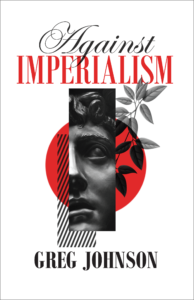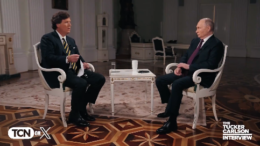Interview with a Vladpire
Posted By Angelo Plume On In North American New Right | 28 CommentsDo you remember when people were saying that Tucker Carlson was finished? He had been fired from FOX News, and although he appeared to enjoy a triumphant return on X, within a few months the excitement of his reappearance had worn off. Rather than creating must-see episodes, Tucker was interviewing weirdos with dirt on Barack Obama’s sex life and other nobodies. Well . . . you can’t cuck the Tuck, as they say. He has once again caught the world’s attention by scoring an interview with, depending on your perspective, the villain of the twenty-first century or the greatest champion of traditional values in a world gone mad: Vladimir Putin.
The interview [2] was aired on February 9, in the earliest of the morning hours for those of us living in Europe. Now that several hours have passed and the dust has settled, we can take stock of what transpired. The consensus seems to be, “Is that . . . is that it?” Like the impatient judges who cast their verdicts on Tucker’s career without giving him time to adapt to his new home on alternative media, many were quick to declare the interview with Putin a total flop as well, passing their judgements well before it was possible for them to have seen the full two-hour-long conversation. In all honesty, though, the interview was underwhelming right from the start.
In response to the very first question, Putin made a petty dig at Carlson (“Are we going to have a serious conversation or not?”) and then launched into a lecture on the entire history of Russia than took up roughly an hour. Even for someone who enjoys learning about history, in particular the fascinating and influential history of Russia, it was a bit much. At one point, Tucker had to interrupt Vladimir and say, “I beg your pardon. Can you tell us what period? I’m losing track of where in history we are.” “The thirteenth century,” came Putin’s reply. Phew! Only some 700 years more to go! Now, please, Mr. Carlson, be serious and stop interrupting.
Before getting into the interview itself, Tucker gave a brief introduction to set the stage during which he said that, when the conversation had been taking place between the two, he and his team thought Putin was “filibustering” with his hour-long monologue covering over 1,000 years of Russian history. It was easy to see why Carlson would have felt annoyed. In fact, one of his few truly incisive questions was never answered. If Putin believes that Russia has a 1,200-year-old claim to the lands called Ukraine, why did he wait during 22 years of his presidency to do something about it? Why now? Putin ignored this question and carried on with the history lesson.
Almost everyone will be disappointed with the interview, especially given the hype that preceded it. Those who were hoping for Putin to chastise the West for its hypocrisy, its loony liberalism, its false promises to Ukraine, will be disappointed. Those who were hoping for the prevention of World War III thanks to a cordial conversation between a journalist who ostensibly is trying to foment understanding and peace between two superpowers and the leader of one of those superpowers, will be disappointed. Those who simply wanted an entertaining and spicy interview with Vladolf Putler will be disappointed. Perhaps the only people not disappointed are those who have been saying for years that Putin has his own interests, and his interests have nothing to do with saving Western Civilization from the Woke Mob or the Globalists. In fact, Putin’s vision for Russia is clearly a species of civic nationalist imperialism. It’s “globalism,” but with a shot of vodka and fewer rainbow flags.
Putin explained it all himself. He put on full display his hatred of nationalism. He whined about Nazis. Along with Russia’s 1,200-year-old claim to Ukrainian territory as justification for his “Special Military Operation,” Putin went on to cite his other justification: denazification. Putin invaded Ukraine because, in his view, it is Russia’s duty to fumigate Ukraine and cleanse it of its “Nazi” infestation. Like someone who watches Alex Jones all day, Putin believes that the West, too, is ruled by crypto-Nazis, and Putin’s idea of a “Nazi” is a 90-year-old Second World War veteran who defended his homeland from Bolshevik invaders [3]. When Putin brought up Yaroslav Hunka, my eyes nearly rolled entirely backwards. It was just more of the same retarded, tiresome, and downright boring discourse with which we are all so familiar. “You’re a Nazi!” “No, you’re a Nazi!” For an interview that was supposed to break the Internet, nothing especially insightful was said.
 [4]
[4]You can buy Greg Johnson’s Against Imperialism here [5].
Putin may be sincere in his belief that Ukraine is rife with “Nazis” and that it is his duty to purge them, but I do suspect that Putin is also playing this denazification thing as a way to appeal to Westerners and sugar-coat his invasion. “Why’d ya do it, Vlad?” asks the world. “I’m just fighting the Nazis,” Putin shrugs. “Don’t you want me to fight the Nazis?”
Many a MAGA-hat-wearing boomer conservative supports Putin precisely because they think he is taking on the crypto-Nazis who control the world, and Putin does nothing to disabuse them of this notion. He encourages it. And even if he were sincere, so what? People who defend Putin’s denazification quest, even people who are not supporters of Putin, will say that, well, as a Russian, Putin has understandable animosity towards Nazis and National Socialist ideology. With all due respect, I don’t care. I live in a world where hammers-and-sickles fly with impunity, where former members of Marxist-Leninist youth parties become chancellors of Germany and then go on to enact arguably the most disastrous policies of the twenty-first century by flooding the country with over a million “refugees” from the Third World. We have understandable reasons to hold a grudge against Communists, yet rather than decommiefying our countries, we permit their presence even in the uppermost levels of power, and to add insult to injury, we are told these ex-Communists are actually Nazis.
Furthermore, as Tucker Carlson himself pointed out to Putin, “Hitler’s been dead for 80 years,” and what business is it of yours, anyway, what goes on in a country — like Ukraine — which you do not govern? “You want to extinguish or at least control Ukrainian nationalism,” Tucker said, “but how? How do you do that?” To Tucker’s credit, he pressed this question. “What is denazification? What does that mean? How do you go about doing that in a country you don’t control?”
This was one of the few enlightening moments of the whole interview, and certainly the first hour or so of it. What was rather troubling about Putin’s answer — which did not do much to explain what denazification is, how Russia will go about it, or why Putin feels that Russia has the right to do it — is that he clearly believes the job of denazifying Ukraine is nowhere near finished. This stance undermines, or at least reduces to irrelevance, the idea that Russia invaded Ukraine because it felt encroached upon by NATO. Indeed, Putin did mention the “five waves of NATO expansion” several times during the interview, and I was hoping he would make a sincere case against NATO’s actions and explain how all this bloodshed and upheaval could have been avoided were it not for the behavior of the Western powers. Putin did do this, to an extent. He confirmed, if you’re willing to believe him, that Boris Johnson sabotaged peace negotiations in Istanbul. He confirmed that he ordered the withdrawal of Russian troops from Kiev as a sign of Russia’s willingness to negotiate without holding a knife to Ukraine’s throat, only for Ukraine to go back on its promises to sue for peace. He repeated the claim that the decision to launch the Special Military Operation was caused by a 2014 “coup” in Ukraine which was backed the CIA. He lamented betrayal and broken promises on the part of Germany, Poland, and France. He recalled the attacks on Crimea and the Donbas. In that moment, he made a genuine case for Russia’s cause and his actions. Importantly, he denied that Russia wants to fight a global war and stated that he would only engage in a conflict with Poland, for example, if Poland attacks Russia. While it is good to hear this rejection of expansionist aims, one can understand why Ukrainians might not believe him.
Whatever the truth is, none of it matters if what Putin really wants is to reclaim lands he believes belong to Russia. Some who is neutral could sympathize with that reason, especially if the people of those lands feel Russian and want to be part of Russia, but even that reason fails to matter if, as Putin said, he wants to “uproot” the “seedlings” of Ukrainian nationalism. His justifications for this are comically hypocritical. In Putin’s opinion — and a frighteningly weighty opinion it is — if Ukrainians see themselves as a separate people, that’s fine, but they cannot see themselves as a separate people within a “Nazi” mindset. That’s a no-no. That requires a Russian military intervention. How is this any different than the liberal “Atlantic” powers going around the world bombarding liberal democracy onto everyone, whether they want it or not? Listen, Libya, you can be a sovereign country, just not that way.
It’s laughable that European Union stooges such as Guy Verhofstadt and mainstream media organizations such as CNN are clutching their pearls, [6] bemoaning a propaganda victory for Putin that threatens to kill democracy. In the end, the interview was a shambles if you’re a Putin supporter. For over an hour, he came across as rambling and resentful, motivated by revanchism and imperialism. Tucker Carlson didn’t cover himself in glory, either. While he did manage to ask a few rapier questions, he could not wrangle Putin under control and get him to answer. It’s a pity, really. I can’t help but think that if such an interview had taken place in a time when IQs were higher and statesmen were rather more dignified, this meeting would have been historic, indeed. Instead, it was just “content” for reactosphere hot-take hustling — which I suppose this article itself is guilty of participating in — and will be forgotten by the next news cycle.
